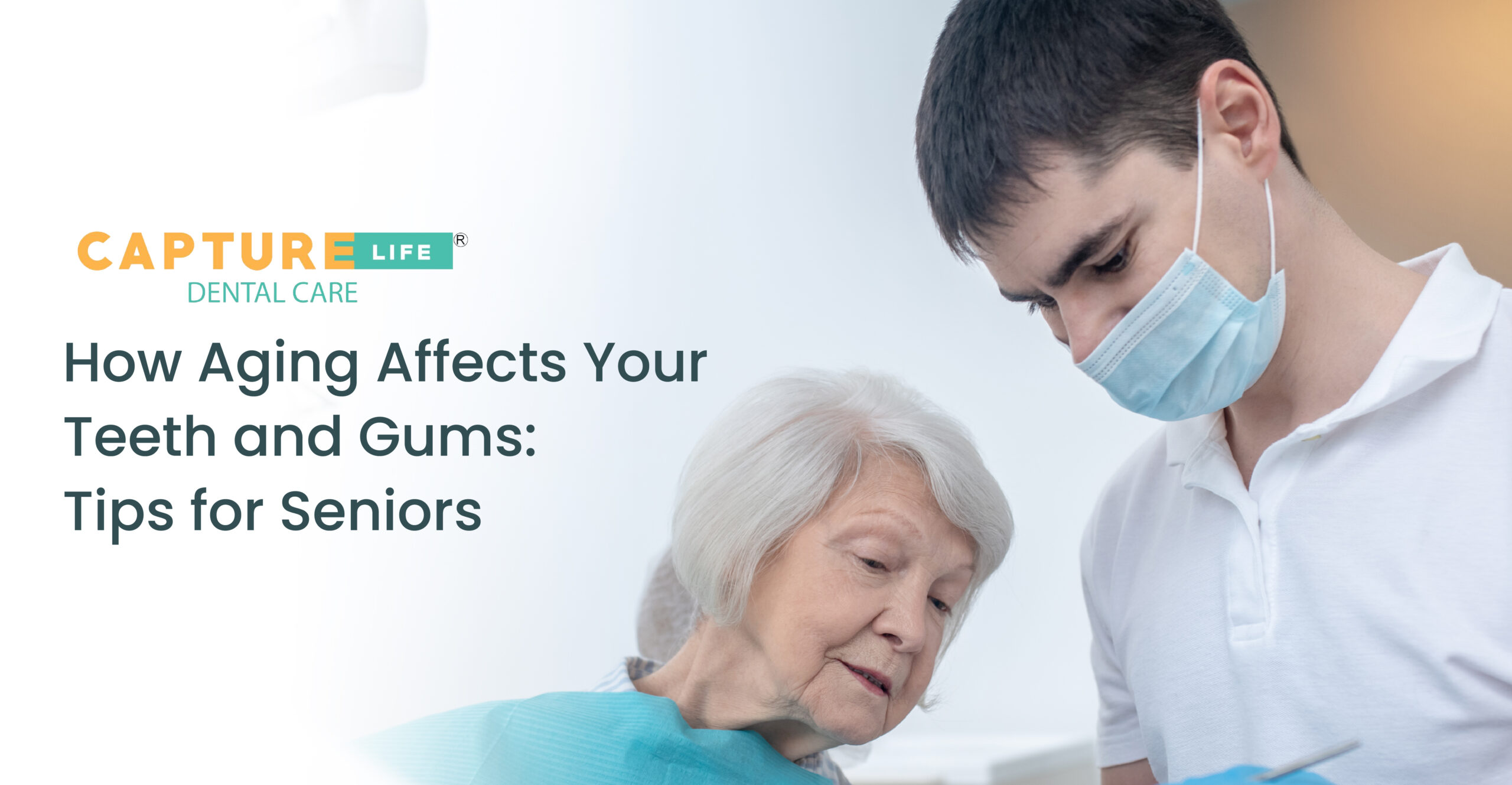
17 Jan Protecting Your Teeth as You Age: Tips for Seniors
As we age, our bodies undergo a variety of changes, and our oral health is no exception. Teeth and gums are not immune to the effects of aging, and seniors may face unique challenges when it comes to maintaining a healthy smile.
At Capture Life Dental Care, we understand the importance of good dental hygiene at every stage of life.
In this blog, we’ll explore how aging can impact your oral health and offer practical tips for seniors to keep their teeth and gums in top condition.
1. Increased Risk of Tooth Decay
As we grow older, the enamel on our teeth naturally wears down, making them more vulnerable to decay. This is especially true for seniors who may have had their teeth for several decades. Additionally, dry mouth, a common side effect of aging and certain medications, can contribute to tooth decay.
Saliva is essential for neutralizing acids and washing away food particles, and a lack of it increases the risk of cavities.
Tip: To combat dry mouth, drink plenty of water throughout the day, use a fluoride toothpaste, and consider a saliva substitute if recommended by your dentist. Regular dental checkups are key to identifying and treating cavities early.
2. Gum Disease and Recession
Gum disease is another common issue for seniors. As we age, our gums may begin to recede, exposing more of the tooth’s surface and even the tooth root. Gum recession can lead to increased sensitivity, especially to hot or cold temperatures, and may make teeth more prone to decay.
Gum disease also becomes more of a concern as plaque builds up over time, and if left untreated, it can progress to more severe stages, such as periodontitis. This can lead to tooth loss if not addressed.
Tip: Brush gently but thoroughly with a soft-bristled toothbrush to avoid further gum damage. Floss daily and consider using an antibacterial mouthwash to help reduce plaque buildup. Don’t skip regular cleanings and checkups with your dentist, as they can spot gum disease before it becomes a bigger issue.
3. Tooth Sensitivity
Tooth sensitivity is common in seniors, especially as the enamel thins over time. Exposed tooth roots, which become more common with gum recession, can cause discomfort when eating hot, cold, or acidic foods. Even brushing too hard can trigger sensitivity.
Tip: Use toothpaste designed for sensitive teeth and avoid overly hot or cold foods. Be gentle when brushing, and try switching to a toothbrush with softer bristles. If you experience persistent sensitivity, consult your dentist about treatment options like fluoride varnishes or desensitizing agents.
4. Changes in Dentures or Fillings
Many seniors wear dentures or have fillings, and over time, these dental appliances may need adjustments. Dentures can lose their fit, causing discomfort and even making it harder to chew. Similarly, fillings, crowns, and bridges may become worn out or damaged, leading to further oral health complications.
Tip: Have your dentures or dental appliances checked regularly to ensure they still fit properly. If you have dental work like fillings or crowns, talk to your dentist about whether they need to be replaced or repaired. Proper care and maintenance of dentures, such as cleaning them regularly, can also extend their lifespan.
5. Oral Cancer Risk
As we age, the risk of developing oral cancer increases. This is particularly important for seniors who may have smoked or used tobacco products in the past. Oral cancer can develop in the gums, tongue, lips, or throat, and often presents with symptoms such as sores that don’t heal, pain when chewing or swallowing, or a lump in the mouth.
Tip: Regular dental exams are crucial for detecting early signs of oral cancer. Your dentist can perform an oral cancer screening during your routine checkup. Avoiding tobacco use and limiting alcohol consumption also helps reduce your risk.
6. Dry Mouth and Medication Side Effects
Many seniors take medications for various health conditions, and one common side effect of these medications is dry mouth. Reduced saliva production can lead to discomfort, difficulty swallowing, and an increased risk of tooth decay and gum disease.
Tip: Stay hydrated by drinking plenty of water and consider using saliva substitutes or oral moisturizers. If you experience chronic dry mouth, speak to your dentist or doctor about possible remedies or adjustments to your medications.
7. Diet and Nutrition
A balanced diet plays a crucial role in oral health at any age. For seniors, maintaining good nutrition is essential to keep teeth and gums healthy. A diet rich in calcium, vitamin D, and other essential nutrients helps support strong teeth and bones.
Tip: Incorporate plenty of fruits, vegetables, and dairy into your diet. Foods like cheese and yogurt can help neutralize acids in the mouth and promote saliva production. Avoid sugary and acidic foods that can contribute to decay and enamel erosion.
Conclusion
As you age, it’s essential to stay proactive about your dental care. With regular dental visits, proper brushing and flossing, and a healthy diet, you can maintain a bright, healthy smile for years to come.
At Capture Life Dental Care, we’re here to support seniors in every stage of their oral health journey.
If you haven’t had a checkup in a while or have concerns about your dental health, we invite you to schedule an appointment with us today.
Together, we can help you achieve the healthiest, most beautiful smile possible!

